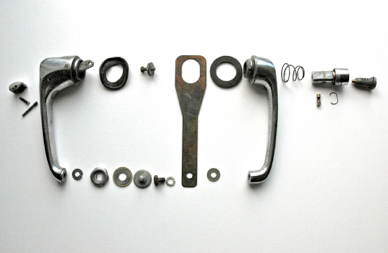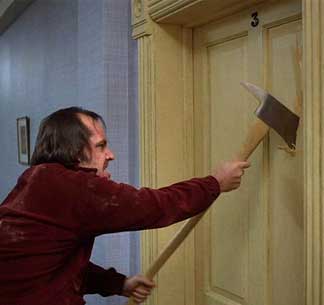Door handle
The door handle, also known in vernacular English as "the knob", is a modern mechanism which serves several purposes. Noam Chomsky is often quoted: "To know the door handle is to 'know' mankind." It is less glamorously stated as "understand the knob and you 'get' the man" by Pam Anderson.
The door knob is rarely studied but its significance in the history of humanity is extremely significant. In its lowest sense, it is an invaluable object used to facilitate the opening and closing of doors. One can easily imagine the impossibility of pulling open a hinged door without this essential apparatus. Closing a door lacking a handle behind oneself is always possible but it comes with a hefty price: following the closing maneuver, the individual would then be made prisoner since he would lack a grabbing point to reopen the obstacle. Of course, he could break the door down, but that practice would prove a financial burden in the long run. Therefore, a reasonable individual clearly realises the utmost importance of door handles. Read on to explore this quite fascinating topic with us.
Etymology
The nomenclature "door handle" is made up of the word door (as in gate, transition point, portal to the Demonic Realm) as well as the word handle (as in h-a-n-d-l-e). They both have separate etymologies. As Germanic languages always place the adjective before the noun, and as English is a Germanic language, "handle door" is not a grammatically valid noun phrase. Door comes from the old German word thurh which meant opening. All openings and holes in old English were called thurhs. Holes in an architectural frame have evolved to "door" in Modern English while wet salty sticky holes have taken various names depending on the country and context.
Knob is spelled with a k, but the k is pronounced only by novice English speakers and Australians.
History of door handles

It is a well-known historical fact that the Romans invented the door but the Greek intelligentsia, being more technologically advanced and somewhat tired of having to smash their doors to pieces, invented the handle to be able to pull the door safely and effortlessly.
“For the love of Poseidon, it was so simple! Why in Aphrodite’s name didn’t we think of this earlier?”
The Romans subsequently conquered Greece but failed to notice the usefulness of the invention since they blasted through every Greek door with battering rams while simply pulling the handle would have sufficed. The invention was forgotten until the Knights Templar happened to stumble upon an abandoned door handle in the ruins of Thessalonica while on their way to a bachelor party in Jerusalem. Realising the importance of that discovery, they founded a secret society which would control the human realm thanks to their exclusive knowledge of the innovation: the Illuminati were born.
The word Illuminati can be translated from Bavarian rune language to: "Those who are illuminated by the knowledge of the handle pertaining to the thurh". In Malta (the last remaining Templar stronghold, where 99% of door knobs are manufactured) simply taking apart a door knob to study its mechanics is punishable by death. Manufacturing unlicensed door knobs is prohibited in the EU, in 47 US states and in most of India. Door handles are available on the black market, though – when installing counterfeits one should be aware that a lethal door-handle malfunction is likely.
Controversy

The modern-day door handle is not exempt from controversy as it is also responsible for keeping doors closed which may be irritating to those who cannot walk through doors; therefore the apparatus is sometimes considered a double-edged sword. People also break their teeth when they happen to trip in the vicinity of a door, identifying the protruding handle as the culprit for their toothlessness. There is heavy speculation to the effect that dentists are particularly fond of this great invention and heavily invest in the powerful door handle lobby.
People who don't possess door handles are usually situated at one of the extremes of the financial wealth spectrum, as they are either homeless blokes who lack the opportunity to open and close doors or rich lads who can afford automatic opening doors usually made out of new and expensive materials. The latter are generally considered pariahs to the traditional way of opening a door, and are shunned by their peers.
Composition and functioning
Modern door handles are made of either metal or metallic metals which are suitable for operating the mechanism that lets go a door from its frame. The universally recognized modus operandi to safely and effectively operate a door handle is described here.
- Stand in front of the door, about two feet away from the obstacle. If in doubt, use a tape measure. Feet at approximately shoulder width, extend your door-opening arm and firmly grab the apparatus. Rotate the handle counterclockwise 90 degrees and gently push the door. If you try the above and nothing happens, it is either because you have mistakenly turned the knob clockwise and/or the door should be pulled. If the problem persists, unlock the door.
- WARNING: Do NOT try to rotate the handle farther than 90 degrees. Injuries sustained from trying to do so may include, but are not limited to, wrist strain, bicep tendon tear, compound humerus fracture, post traumatic stress disorder, clinical hysteria and Guatamalan Chicken-pox.
Comparison with locks
Door handles are similar to locks as the two of them facilitate both keeping a door closed and allowing them to be opened. They are different however in one vital aspect: a key or code is necessary to open a lock while a hand is necessary to use a door handle. If one lacks both hands, the combined use of a person's stumps should do the trick. Teeth can also be put to contribution in the event of an emergency, but this method should be parsimoniously used.
Placement

Door handles are both traditionally and strategically placed one meter above floor level. This particular design is aimed to facilitate its use by adults who sport normal length of bone but to refrain young children and babies from accessing sensitive areas like their parent's bedroom where some highly classified experimentations may be unfolding.
Common door handles are usually situated on the left in most houses and on the right side in offices. This confusing and seemingly illogical fact of life means that inside habitation spaces, the door handle will be found on the right side and inside offices, it will occupy the left side.
If a door separates two rooms where one serves as an office and another as an habitation area, a carpenter will either flip a coin or ask their priest which side it would be preferable to install the handle on. As the bible talks abundantly about door handles but fails to specify a precise placement procedure, the priest will either improvise an answer or ask the carpenter to stop wasting his time. Most churches do not possess a significant number of doors and thus lack door handles, though each Christian place of worship has a dark basement with a room which always seems to have a door handle and a sturdy lock. This particular room always seem to be tightly closed and locked immediately following youth choir practice.
Alternatives
In the post-modern age it has become common view amongst academic intellectuals that the "door handle" has been the greatest barrier in overcoming gender equality. If a couple holds onto the patriarchal custom of having the male open the door for the female, the authority the bull has over its female is polarised in a clear asymmetrical way. The door handle as a control device for male domination in standard relationships allows the male to regulate when his female companion is allowed to pass through a door frame and when she may not.
While the act itself is considered kind and chivalrous on the man's part towards his possession, it ultimately traps the damsel in a symbolic ownership, the latter being unable to pass through a door without the bull's symbolic permission, making her his virtual slave. Post modern friendly households no longer have door handles but use modern forcefield technology. Better yet are houses with no doors at all as door handles are considered by many educated people as western colonialist classism through hegemonic oppression. It should be noted that possessing no doors at all helps in resolving domestic disputes and intellectual flatulence but it could prove quite expensive as heating costs could become another subject of discord in the household.

